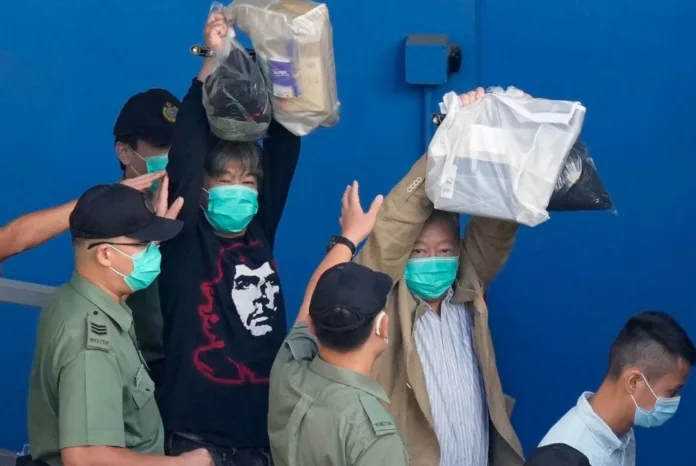The trial, under China’s national security law, marks the largest crackdown on pro-democracy figures since the law’s enactment in 2020.
A Hong Kong court has convicted 14 democracy activists of subversion, while acquitting two others, in the largest national security case since Beijing imposed its controversial National Security Law (NSL) in 2020. The trial has become a symbol of the intense crackdown on dissent in the semi-autonomous city.
These activists are among the 47 charged in 2021 with attempting to “overthrow” the government by organizing an unofficial primary election. While 16 of the accused entered not guilty pleas, 31 activists admitted guilt, likely in hopes of receiving reduced sentences given the slim chances of a fair trial.
The convicted individuals range from veteran politicians to student campaigners, representing a broad spectrum of Hong Kong’s pro-democracy movement. Their arrests mark the most significant enforcement action under the NSL, which Beijing argues is essential for Hong Kong’s stability. However, rights groups contend the law has effectively crushed civil liberties and created an environment of fear.
The NSL criminalizes acts deemed as secession, subversion, terrorism, and collusion with foreign forces, with penalties including life imprisonment. The law’s broad scope has led to widespread arrests and the dismantling of civil society organizations. Critics argue that its application has decimated the vibrant, diverse civil society that once thrived in Hong Kong.
During the trial, observers noted the practical reasons behind the guilty pleas. “Many have likely done so as a pragmatic decision, recognizing that the chances of a fair trial are slim,” said Simon Cheng, an exiled pro-democracy activist. “By pleading guilty, they might hope to receive reduced sentences and avoid even harsher penalties. It’s a tragic reflection of how activists are being forced into concessions.”
Amnesty International echoed these sentiments, describing the situation as forcing activists to make “the impossible decision between pleading guilty to a non-existent crime for a potential reduction in sentence, or fighting a losing battle under the unjust national security law.”
The trial also highlighted individual cases, such as that of Lee Yue-shun, one of the two acquitted activists. Judges noted his clear record and lack of involvement in the group’s declarations. Although he was aware of his party’s stance on vetoing budgets, he had instructed team members to redesign pamphlets to avoid violating the NSL. The judges concluded there was insufficient evidence to prove Lee intended to subvert state power.
The trial’s outcome has severe implications for Hong Kong’s pro-democracy movement, further silencing voices advocating for human rights and democratic freedoms. The convictions send a stark message to remaining activists and the broader public about the risks of dissent under the NSL.
Beijing maintains that the NSL is crucial for maintaining stability in Hong Kong. In contrast, the international community and human rights organizations argue that the law undermines the city’s autonomy and erodes the freedoms guaranteed under the “one country, two systems” framework established when Britain handed Hong Kong back to China in 1997.
Analysis:
The convictions of 14 democracy activists in Hong Kong under the National Security Law represent a pivotal moment in the city’s ongoing struggle for democratic freedoms. This case underscores the severe impact of the NSL on political activism and civil society in Hong Kong.
Politically, the trial highlights Beijing’s determination to suppress dissent and maintain tight control over Hong Kong. The NSL’s broad provisions allow the Chinese government to target a wide range of activities and individuals, ensuring that opposition movements cannot gain traction. This approach significantly reduces the space for political activism and public debate, reinforcing an authoritarian grip on the region.
From a sociological perspective, the crackdown has created a climate of fear and self-censorship among Hong Kong residents. The arrests and subsequent convictions serve as a deterrent to those considering participating in pro-democracy activities. This fear extends beyond activists to ordinary citizens who may now hesitate to express dissenting views or engage in political discussions. The erosion of civil liberties in Hong Kong represents a significant shift from the city’s previously vibrant and open society.
Economically, the impact of the NSL and the resulting political instability may deter foreign investment and harm Hong Kong’s reputation as a global financial hub. Companies and investors may perceive increased risks associated with operating in a region where the legal and political landscape can change rapidly and unpredictably. Moreover, the focus on political suppression diverts attention and resources from economic development, potentially hindering growth.
Locally, the trial and its outcomes have profound implications for community cohesion and trust in public institutions. The aggressive enforcement of the NSL has likely deepened divisions within Hong Kong society, pitting pro-Beijing supporters against pro-democracy advocates. This polarization may lead to increased social tensions and further erode the trust between the government and the governed.
Gender and race also intersect in this context, although less prominently than political and civil rights issues. The crackdown affects a diverse group of activists, including women and ethnic minorities, highlighting the broad reach of Beijing’s authoritarian measures. The suppression of voices from various demographic groups further marginalizes those already facing social and political challenges.
In summary, the conviction of 14 democracy activists in Hong Kong under the National Security Law marks a critical juncture in the city’s political landscape. The trial’s outcomes underscore the extensive impact of Beijing’s authoritarian measures on political activism, civil liberties, economic stability, and social cohesion. As Hong Kong navigates this new reality, the international community’s response and the resilience of its pro-democracy movement will play crucial roles in shaping its future.
